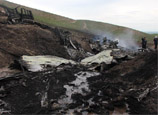
Edited and translated by Liang Jun, People's Daily Online
At the invitation of Chinese leaders, Palestinian President Mahmoud Abbas and Israeli Prime Minister Benjamin Netanyahu will visit China from May 5 to 7 and from May 6 to 10 respectively. This is the first time for the leaders of the two sides to visit China in succession. It attracted widespread attention of local media, which think China plays an increasingly important role in the Mideast issues.
Chinese special envoy to the Middle East Wu Sike said on April 29 that Abbas is the first Middle East leader China's new leadership will meet. It will be Netanyahu's first visit to China after winning his third term as prime minister; it is also the first time for an Israeli Prime Minister to choose China as the destination of his official visit after taking office.
Wu said as the third special envoy to the Middle East, he has visited Palestine and Israel more than 10 times over the past four years. The important mission of his visit to Palestine and Israel from April 26 and 29 is to make preparation for the two leaders' visits to China, meanwhile, listening to the consideration of both sides on Israeli and Palestinian issue and perspectives on regional situation.
On April 27, Wu met with Tayeb Abdel Rahim, Secretary General of the Presidency of the Palestinian National Authority (PNA) and other officials in Ramallah. Rahim expressed sincere appreciation for China's stance to support Palestine to join the United Nations and Chinese assistance in various aspects such as politics and economy.
He said Abbas' visit to China will further strengthen cooperation in various fields between the two sides and push to create a Palestine state. He reiterated Palestine's stance for resuming peace talks: Israel acknowledges the two-state solution based on the 1967 borders, stops building settlements and releasing Palestinian prisoners.
Wu met with Israel's Deputy Foreign Minister Zev Elkin and other officials in Jerusalem. Both sides exchanged their views on regional issues including Mideast peace talks.
Israeli officials said China's economic power and international status had enhanced quickly and Israel attaches great importance to Netanyahu's upcoming visit to China. They believe it will upgrade bilateral cooperation in various areas.
Wu said China always believes Palestine issue is at the core of the Mideast issues. The stagnation of peace talks affects not only the stability and development of the Middle East but also the peace and stability of the world. Promoting to solve the Palestinian issue will have positive influence in the region.
China has for long time advocated resolving issues through negotiation and pays much attention to the peace talks; it backs an independent Palestine state based on the two-state solution.
China supports to promote peace talks on the basis of land for peace, the U.N. resolution and the Arabia Peace Initiative, which were approved by relative parties and proved to be effective for years.
China is willing to work with international community and plays a more positive and constructive role in advancing the establishment of the Palestine-Israel mutual trust and solving issues through negotiation.
Regarding Syria issue, Wu said Syrian crisis has lasted for more than two years and caused huge losses. It proved that military action cannot solve Syrian issue and both sides should abandon the thinking to reach the purpose through military action. Political means are the only correct choice.
On Iranian nuclear issue, Wu said China has been clearly against Iran's production and possession of nuclear weapons. He stressed that developing ties between China and the Mideast countries are China's firm foreign policy. It is also an important aspect to realize the Chinese dream.
Read the Chinese version: 中國將在中東發揮更大作用
















 Huge rubber duck visits Hong Kong
Huge rubber duck visits Hong Kong


![]()
